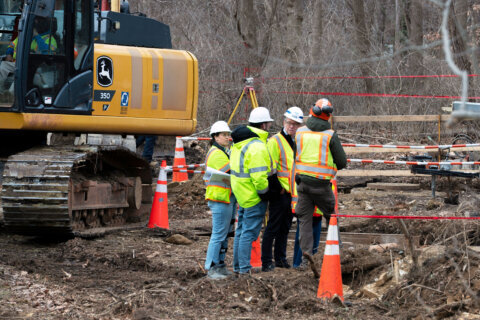Ukraine might be far away, but after the Russian invasion, a Northern Virginia psychiatrist said she’s hearing from parents of elementary school kids who are worried about safety.
“Parents have been emailing me saying, ‘Hey, what do I tell my elementary-age kid about safety at home, when the issues with Russia and Ukraine seem to be escalating on a daily basis?'” said Dr. Asha Patton-Smith, a Kaiser Permanente adult, child and adolescent psychiatrist who practices in Burke and Falls Church.
Patton-Smith said a lot of the children don’t have direct ties to either Russia or Ukraine, but there’s concern about war, and they’re asking, “Is something going to happen here in the States? Or is something going to happen in another country?”

“I’m asking my parents, ‘How is this on their radar? Is this discussed at school? Are they discussing it amongst friends?,'” Patton-Smith said, noting that children are getting the information directly and indirectly, from hearing parents discuss it with other people or absorbing content through social media or the news — even if they don’t seem to be paying attention.
“Kids are sponges. They are really soaking up everything,” she said. “A lot of parents were surprised that kids who seem to be playing or doing other things [and] not seem to be paying attention to the background noise that was discussing these conflicts are things that kids are cluing into.”
She said parents should monitor and limit what children are being exposed to in their environments; ask open-ended questions to get their perspective, and view content with them to respond to questions or concerns.
“The parent is there to make sure that safety is being reinforced and that the child feels comfortable and protected,” Patton-Smith said. “Reinforce that you’re in a controlled environment — ‘We do everything we can do to keep you safe.'”
Keeping a structured routine reinforces feelings of safety for children. Routines such as having dinner together as a family, getting enough sleep and having regular play time are important.
Patton-Smith recommends empowering children by showing them ways to help with what’s happening in Ukraine or other types of issues related to violence and unrest that they may have concerns about.
“I have some kids that have contacted me about things they’re doing, charity work they’re doing, donations — for those in the faith community, praying — and really trying to be very open about empowering others to recognize what’s happening around the world, which I think is another teachable moment that is great,” she said.
Patton-Smith recommends the American Academy of Pediatrics Parenting Website and well-being strategies available at KP.org.
“KP.org has a lot of information on reducing anxiety, routines, depression, healthy eating, sleep — all things that are extremely important for everyone with regard to just overall balance and safety,” she said.







